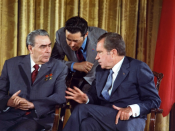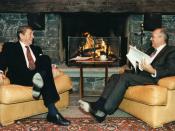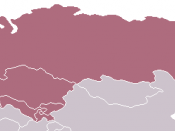Political events in the 20th Century inevitably influenced music written by composers of the time. Of particular and dominating importance was The Cold War, lasting forty years before glasnost began in 1985, and causing many cultural changes throughout its duration.
With the breakout of war between the Soviet Union and the United States of America, any interaction between the people of these two countries was cut off, despite the fact that there was no violence and fighting in this war - hence the reason it is known as the Cold War.
Between 1945, when the Cold War began - and so did the post-modern period of music - and 1985, when glasnost began, the shared music of the world ceased. Russian music was unavailable in America, although it was previously popular there. This resulted in a return to nationalism of sorts. Russian composers became frustrated with the 'censor' placed on them - they could not express the music of their country to anyone outside of the Soviet Union, and it would remain that way until the fall of the Iron Curtain.
The War continued - and did the limitations on composers - until 1985, when glasnost began. Glasnost means "openness" in English and it resulted in the previous problems between the Soviet Union and the United States of America seemingly being forgotten about or, at the very least, dismissed. Composers were free once again to express their music.
The main effect on music of The Cold War was the introduction of diversity in tonality. Nielsen was made famous for this by his invention of "progressive tonality" in his symphonies, where he began in one key and ended in another. This was a novel idea in the music world and soon became Nielsen's trademark. Other forms of tonality were also...



Great Essay, A good attempt at the topic.
This is a great essay and a well deserved attempt at the topic. This essay is well supported and is an interesting read. Good Work!
3 out of 3 people found this comment useful.